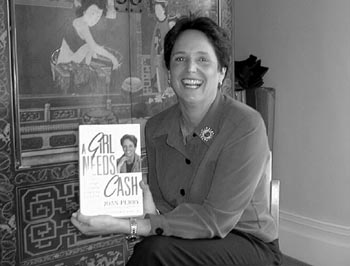Get the Money, Honey
Dollar diva advises women how to maximize their greenbacks--with or without a man
By Cecily Barnes
HAVING JUST BANKED a $20 million divorce settlement from her ex-husband, Gary Wendt, CEO of General Electric, Lorna Wendt still has complaints. Sitting in the office of Los Gatos investment banker Joan Perry, who recently released her book, A Girl Needs Cash, Wendt calls herself a "poor little rich girl" since she hasn't gotten her hands on the settlement yet.
"Actually," Wendt says proudly, "the settlement says I get alimony payments for the rest of my life. So even if Gary dies, his estate will pay me."
The other women nod, impressed by this feat. Perry leans forward to share a devious thought.
"I bet he hates writing those checks," Perry drawls, with a forceful, open-mouth chuckle. The others chime in, the room echoing with vindictive laughter. Quickly, they regain composure.
Wendt, Perry and Perry's publicist, Ginger Taylor McDonald, sit in Perry's Los Gatos office, having recently returned from a national media tour, during which Perry promoted A Girl Needs Cash and Wendt publicized her divorce settlement. After a 32-year marriage, Wendt refused her husband's $10 million divorce offer and successfully took him to court for half their assets, totaling more than $20 million.
"Gary could never have done what he did if I wasn't there taking care of his every need," Wendt says. "I was not a 10 percent partner; I was a 50 percent partner. I have gotten over 50 percent of our hard assets."
Perry and Wendt met on the Gail King Show to talk about women and money. Wendt created the Foundation for Equality in Marriage, which promotes the same goals as Perry's book. But rather than advocating split-asset divorce settlements, Perry's book encourages women not to give up total control of their finances in the first place. Instead of passing the buck to husbands, brokers and fathers, women should learn to do it themselves.
"Women are not taught to talk about assets or investing. We're taught to invest in our beauty, and then the guy will come around and take care of us," Perry says. "My husband couldn't leave me high and dry now because I have my own investments. We own things together like this building, and then he owns his own investments and I have mine. I think you do need trust in a marriage, but you don't need blind trust."
Wendt and Perry tell of their old lives and past marriages, when they never asked their husbands about how their money was invested or what rate of return they earned.
"I was working on Wall Street, and I would come home and give my paycheck to my husband. He paid all the bills," Perry says. "I didn't even know what [assets] my husband had. I got $25,000 out of the divorce settlement, which is horrendous."
Wendt recalls the "humiliating" questioning her husband would barrage her with at bill-paying time.
"I'd come downstairs Sunday morning on my way to church, and he'd be paying the bills. He'd say, 'What did you spend that for?' " Wendt says bitterly. "I really resented that."
" 'Don't you already have a pair of those?' " she mimics. "I always got that."
The three women, left by wealthy husbands, have a discussion wavering between a frank talk about the need for financial independence and an embittered divorced women's group. Only Wendt succeeded in what the women consider an equitable divorce settlement. The others are finding solace by warning others not to make the same mistake they did.
Perry advises women to sign a prenuptial agreement, requiring total exposure of the couple's finances as well as a 50-50 split should the marriage end. And women should have their own investments, Perry says, because anything can happen.
"There's a woman in my office whose husband did the run after Spandex," Perry chortles, referring to men who ditch their wives for young concubines. "When she came in and told us, she was devastated. The first thing we all told her was 'GET THE MONEY,' " Perry emphasizes. "You can be sad later--just get the money."
It may sound shallow, but Perry defends this advice as both a right and a necessity for women trying to protect themselves from poverty. To show she's not exaggerating, she points to a statistic showing that 80 percent of women in America retire below the poverty level. Seventy percent of these women, she adds, had lived middle-class lives.
[ San Jose | Metroactive Central | Archives ]
![]()

Christopher Gardner
From the April 30-May 6, 1998 issue of Metro.
![[Metroactive Features]](/features/gifs/feat468.gif)